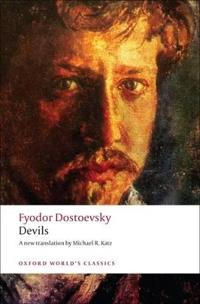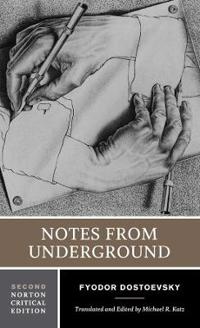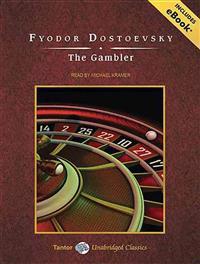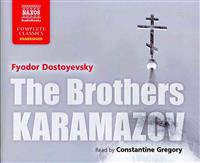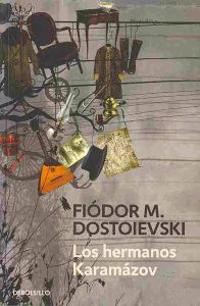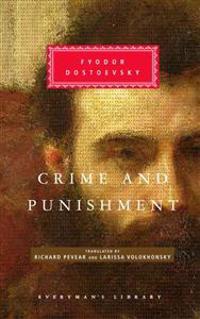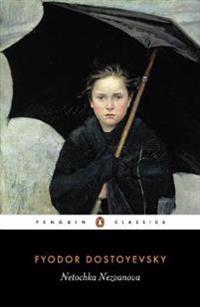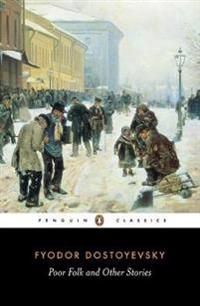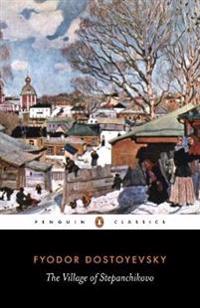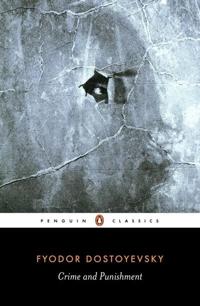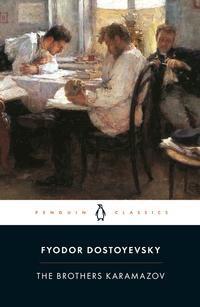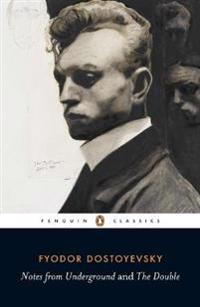Great Short Works of Fyodor Dostoevsky (Häftad)
avFyodor Dostoyevsky
ISBN: 9780060726461 - UTGIVEN: 2004-07The shorter works of one of the world's greatest writers, including The Gambler and Notes from UndergroundThe short works of Dostoevsky exist in the very large shadow of his astonishing longer novels, but they too are among literature's most revered works. The Gambler chronicles Dostoevsky's own add[...]
Devils (Pocket)
avFyodor Dostoyevsky, Michael R. Katz, Fyodor Dostoyevsky
ISBN: 9780199540495 - UTGIVEN: 200807Devils, also known in English as The Possessed and The Demons, was first published in 1871-2. The third of Dostoevsky's five major novels, it is at once a powerful political tract and a profound study of atheism, depicting the disarray which follows the appearance of a band of modish radicals in a s[...]
Notes from Underground (Pocket)
avFyodor Dostoyevsky, Michael R. Katz, Fyodor Dostoyevsky
ISBN: 9780393976120 - UTGIVEN: 200010"Backgrounds and Sources" includes relevant writings by Dostoevsky, among them "Winter Notes on Summer Impressions," the author s account of a formative trip to the West. New to the Second Edition are excerpts from V. F. Odoevksy s "Russian Nights" and I. S. Turgenev s "Hamlet of Shchigrovsk Distric[...]
Notes from the Undergound (Inbunden)
avFyodor Dostoyevsky, Constance Black Garnett, Fyodor Dostoyevsky
ISBN: 9780872209060 - UTGIVEN: 200909Dostoevsky's best-known and most groundbreaking work appears in this new edition in a revision of the "Constance Garnett" translation with an introduction by Charles Guignon and Kevin Aho. The introduction places the underground man in the historical context of nineteenth-century modernity's movemen[...]
Notes from the Underground (CD-bok)
avFyodor Dostoyevsky, Norman (NRT) Dietz, Fyodor Dostoyevsky
ISBN: 9781400168064 - UTGIVEN: 2010-07The Gambler (CD-bok)
avFyodor Dostoyevsky, Michael (NRT) Kramer, Fyodor Dostoyevsky
ISBN: 9781452650722 - UTGIVEN: 2010-12The Brothers Karamazov (CD-bok)
avFyodor Dostoyevsky, Constantine (NRT) Gregory, Fyodor Dostoyevsky
ISBN: 9781843796824 - UTGIVEN: 2013-07Fyodor Dostoyevsky is a titanic figure among the world's great authors, and The Brothers Karamazov is often hailed as his finest novel. A masterpiece on many levels, it transcends the boundaries of a gripping murder mystery to become a moving account of the battle between love and hate, faith and de[...]
Los hermanos Karamazov / The Brothers Karamazov (Pocket)
avFyodor Dostoyevsky, Jose Lain (TRN) Entralgo, Fyodor Dostoyevsky
ISBN: 9788499083940 - UTGIVEN: 2010-01Notes from Underground; The Double (Häftad)
avFyodor M. Dostoevsky, Fyodor Dostoyevsky
ISBN: 9780140442526 - UTGIVEN: 197207'It is best to do nothing The best thing is conscious inertia So long live the underground ' Alienated from society and paralysed by a sense of his own insignificance, the anonymous narrator of Dostoyevsky's groundbreaking "Notes from Underground" tells the story of his tortured life. With bitter [...]
The Brothers Karamazov (Häftad)
avFyodor M. Dostoevsky, Fyodor Dostoyevsky
ISBN: 9780374528379 - UTGIVEN: 200206The award-winning translation of Dostoevsky's last and greatest novel.Richard Pevear and Larissa Volokhonsky were awarded the PEN/ Book-of-the-Month Translation Prize for The Brothers Karamazov and have also translated Dostoevsky's Crime and Punishment, Notes from Underground, Demons, and The Idiot.[...]
Demons (Inbunden)
avFyodor M. Dostoevsky, Fyodor Dostoyevsky, Joseph Frank
ISBN: 9780375411229 - UTGIVEN: 200010Set in mid 19th-century Russia, "Demons "examines the effect of a charismatic but unscrupulous self-styled revolutionary leader on a group of credulous followers.Inspired by the true story of a political murder that horrified Russians in 1869, Fyodor Dostoevsky conceived of "Demons" as a "novel-pamp[...]
The Idiot [With Ribbon Book Mark] (Inbunden)
avFyodor M. Dostoevsky, Fyodor Dostoyevsky
ISBN: 9780375413926 - UTGIVEN: 200204In "The Idiot," the saintly Prince Myshkin returns to Russia from a Swiss sanatorium and finds himself a stranger in a society obsessed with wealth, power, and sexual conquest. He soon becomes entangled in a love triangle with a notorious kept woman, Nastasya, and a beautiful young girl, Aglaya. Ext[...]
The Brothers Karamazov (Inbunden)
avFyodor M. Dostoevsky, Fyodor Dostoyevsky, Dostoevsky
ISBN: 9780679410034 - UTGIVEN: 199204The violent lives of three sons are exposed when their father is murdered and each one attempts to come to terms with his guilt[...]
Crime and Punishment (Inbunden)
avFyodor M. Dostoevsky, Fyodor Dostoyevsky
ISBN: 9780679420293 - UTGIVEN: 199305Raskolnikov, an impoverished student living in the St. Petersburg of the tsars, is determined to overreach his humanity and assert his untrammeled individual will. When he commits an act of murder and theft, he sets into motion a story that, for its excruciating suspense, its atmospheric vividness, [...]
Crime and Punishment (Häftad)
avFyodor Mikhailovich Dostoevsky, Fyodor Dostoyevsky
ISBN: 9780679734505 - UTGIVEN: 1993-03With the same suppleness, energy, and range of voices that won their translation of The Brothers Karamazov the PEN/Book-of-the-Month Club Prize, Pevear and Volokhonsky offer a brilliant translation of Dostoevsky's classic novel that presents a clear insight into this astounding psychological thrille[...]
Notes from Underground (Inbunden)
avFyodor M. Dostoevsky, Fyodor Dostoyevsky
ISBN: 9781400041916 - UTGIVEN: 200403Dostoevsky's most revolutionary novel, "Notes from Underground" marks the dividing line between nineteenth- and twentieth-century fiction, and between the visions of self each century embodied. One of the most remarkable characters in literature, the unnamed narrator is a former official who has def[...]
Crime and Punishment (Häftad)
avFyodor Mikhailovich Dostoevsky, Fyodor Dostoyevsky
ISBN: 9781605205106 - UTGIVEN: 2008-12Netochka Nezvanova (Storpocket)
avFyodor Dostoyevsky
ISBN: 9780140444551 - UTGIVEN: 1985-08"Netochka Nezvanova - A Nameless Nobody" - tells the story of a childhood dominated by her stepfather, Efimov, a failed musician who believes he is a neglected genius. The young girl is strangely drawn to this drunken ruin of a man, who exploits her and drives the family to poverty. But when she is [...]
The House of the Dead (Storpocket)
avFyodor Dostoyevsky
ISBN: 9780140444568 - UTGIVEN: 1985-09In January, 1850, Dostoyevsky was sent to a remote Siberian prison camp for his part in a political conspiracy. The four years he spent there, startlingly re-created in "The House of the Dead", were the most agonizing of his life. In this fictionalized account, he recounts his soul-destroying incarc[...]
Poor Folk and Other Stories (Pocket)
avFyodor Dostoyevsky, David (TRN) McDuff, David McDuff
ISBN: 9780140445053 - UTGIVEN: 1989-03With their penetrating psychological insight and their emphasis on human dignity, respect and forgiveness, Dostoyevsky's early short stories contain the seeds of the themes that came to his major novels. "Poor Folk", the author's first great literary triumph, is the story of a tragic relationship be[...]
The Village of Stepanchikovo (Storpocket)
avFyodor Dostoyevsky
ISBN: 9780140446586 - UTGIVEN: 199506Summoned to the country estate of his wealthy uncle Colonel Yegor Rostanev, the young student Sergey Aleksandrovich finds himself thrown into a startling bedlam. For as he soon sees, his meek and kind-hearted uncle is wholly dominated by a pretentious and despotic pseudo-intellectual named Opiskin, [...]
The Idiot (Storpocket)
avFyodor Dostoyevsky
ISBN: 9780140447927 - UTGIVEN: 200405Fyodor Dostoyevsky's "The Idiot" is an immaculate portrait of innocence tainted by the brutal reality of human greed. This "Penguin Classics" edition is translated from the Russian by David McDuff, with an introduction by William Mills Todd III. Returning to St Petersburg from a Swiss sanatorium, th[...]
Crime and Punishment (Storpocket)
avFyodor Dostoyevsky
ISBN: 9780140449136 - UTGIVEN: 200301A thrilling study of guilt and power, the "Penguin Classics" edition of Fyodor Dostoyevsky's "Crime and Punishment" is translated with an introduction and notes by David McDuff. Raskolnikov, a destitute and desperate former student, wanders through the slums of St Petersburg and commits a random mur[...]
The Brothers Karamazov (Storpocket)
avFyodor Dostoyevsky
ISBN: 9780140449242 - UTGIVEN: 200302Fyodor Dostoyevsky's powerful meditation on faith, meaning and morality, "The Brothers Karamazov" is translated with an introduction and notes by David McDuff in "Penguin Classics". When brutal landowner Fyodor Karamazov is murdered, the lives of his sons are changed irrevocably: Mitya, the sensuali[...]
Notes from Underground and the Double (Storpocket)
avFyodor Dostoyevsky
ISBN: 9780140455120 - UTGIVEN: 200901Collected here in "Penguin Classics" are two of Fyodor Dostoyevsky's shorter works, "Notes from Underground and The Double", translated by Ronald Wilks with an introduction by Robert Louis Jackson. Alienated from society and paralysed by a sense of his own insignificance, the anonymous narrator of D[...]


